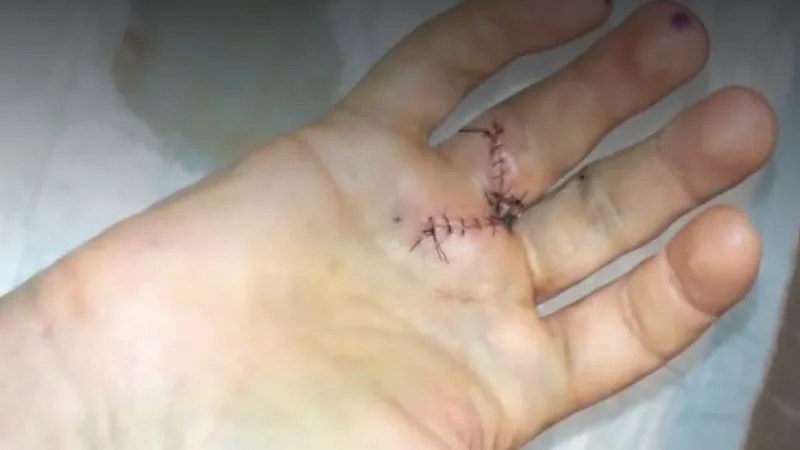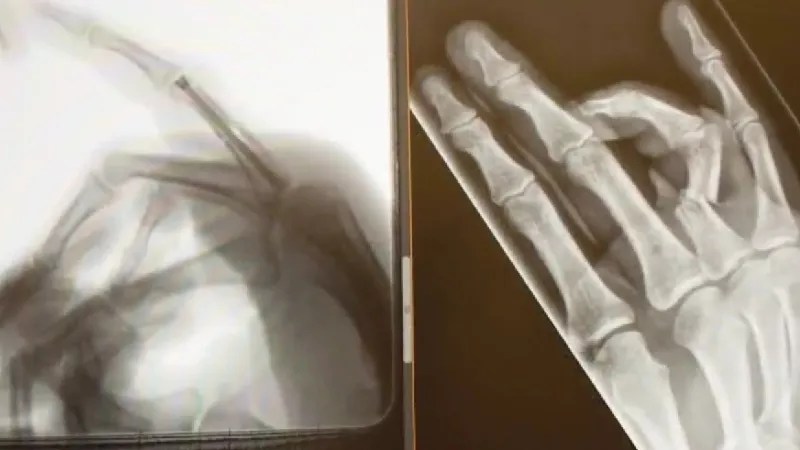

Audio By Carbonatix
Photographer Trevor Hughes nearly had a finger blown off when he was shot with a projectile while trying to capture an image of law enforcement officers during the 2020 George Floyd protests. He filed suit last year, and on October 20, attorney Andrew McNulty of Denver-based Killmer, Lane & Newman LLP revealed that a settlement agreement had been reached with several municipalities, including Denver, Golden, Arvada and Jefferson County.
The combined settlement comes to $485,000, and it continues a trend of big-bucks payouts. Back in January, McNulty predicted that the complaints over brutal behavior by Denver Police Department officers during the social-justice demonstrations would cost the city between $25 million and $50 million. “That might have been an underestimate,” he says now.
Cops from so many different agencies and departments responded to the rallies in downtown Denver that it was hard to determine who was responsible for particular actions. The original defendants in the Hughes lawsuit, filed on August 18, 2021, were Denver and Aurora; only later was it determined whose representatives were actually present when Hughes was injured on May 31, 2020.
“Trevor is a professional photographer,” McNulty notes. “He mainly does portraits by trade, but he went out to document the protests in solidarity with folks who were protesting the murder of George Floyd and police brutality in Denver.”
Hughes was with a group of marchers that came to a halt in an intersection when their route was blocked by a phalanx of police, McNulty continues, “and some of the protesters kneeled in front of the officers, who started shooting projectiles. Trevor backed away and started recording what was happening, and that’s when his camera was blown out of his hand.”

Two X-ray images of Trevor Hughes’s hand.
In some ways, Hughes was fortunate, “because if the camera hadn’t been there, the projectile would have hit him in the face,” McNulty notes. “But it severed one of the fingers on his hand and left it dangling, spurting blood everywhere.”
The severity of the wound meant Hughes needed immediate medical care. “He had to have surgery to reattach his finger,” McNulty says. “It’s held together with a screw and he’s rehabbing it to this day. And all this happened because he was part of a largely peaceful march – but officers still decided to inflict brutality on the protesters, including someone who was filming them and had no intention of doing anything wrong.”
Was Hughes blasted because he had a camera? McNulty doesn’t dismiss the possibility: “When officers target people who are trying to film and and hold them accountable, it’s even more problematic in some sense, since if we don’t have a right to document what’s happening with our public officials in this country, and specifically law enforcement, we’re going to have real problems, as we’ve seen throughout history.”
He adds that “the biggest spurring of social change in this country when it comes to police reform has been around videos, from George Floyd and Rodney King to others. And if those folks had been prevented from filming police by officers, which they tried to do in the George Floyd case, then social change wouldn’t have been spurred. And even folks who aren’t members of the press, like those who filmed George Floyd and Rodney King, are allowed to film police activity and make sure we hold officers accountable when they are violating people’s rights.”
By McNulty’s estimate, “another fifteen to twenty lawsuits are still pending against Denver for these protests,” with multiple plaintiffs behind some of the complaints – and that could make for some expensive math. The $14 million award to twelve protesters represented by the ACLU in March “gets us more than halfway to $25 million,” he notes, and there have been smaller settlements as well, including the $500,000 paid to college student Michael Acker, another McNulty client, who was shot in the eye with a 40mm baton round. The latest settlement is appropriate, McNulty suggests, since “it compensates Mr. Hughes for the pain and suffering he has gone through.”
While other suits work their way through the system, McNulty says that “the citizens of Denver need to keep pushing for reform and change within our law enforcement. If there isn’t change, we’re just going to have more and more of these incidents in the years to come if there’s another protest.”
Westword has reached out for comment to representatives of Denver, Golden, Arvada and Jefferson County. A spokesperson for Golden replied that the city doesn’t have a statement at this time, while a representative for Denver’s Department of Safety offered the following:
While it would be inappropriate to comment on this matter specifically, we can share that the Department of Safety made changes to how to safely and effectively manage large crowds following the 2020 protests including:
• We eliminated the use of 40 mm less lethal equipment for purposes of crowd control.
• We have changed the way officers are permitted to use pepper balls for purposes of crowd management.
• Less lethal equipment training enhanced to help ensure appropriate use in crowd control settings and understanding of commands.
• All officers have received additional training on crowd control response and rapid deployment vehicle tactics.
We continue to evaluate our policies and training to ensure we are using best practices identified by law enforcement throughout the country to better protect peaceful protestors while addressing those who are only there to engage in violence.
Click to read Trevor Hughes v. Denver, et al., and the settlement agreement with the City and County of Denver.
This post has been updated to include responses to the lawsuit settlement from Golden and Denver.